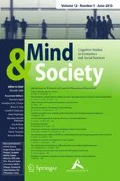Abstract
In this paper, I discuss conditionals as illocutionary speech acts whose interpretation depends upon the whole of the social context in which they are uttered and whose purpose is to affect the opinions and actions of others. I argue for a suppositional approach to conditional statements based in what philosophers call the Ramsey test and developing the psychological theory that conditionals elicit a process of hypothetical thinking in their listeners. By reference to the experimental psychological literature on conditionals, I show that in general conditionals, even ones that are basic or abstract in nature, are not treated as truth-functional or material by ordinary people. Drawing upon the suppositional nature of conditionals and the influence of pragmatic implicature, I discuss uses of conditionals as advice, inducement, persuasions and dissuasion, arguing that speakers use conditionals to try to influence the beliefs and actions of their listeners by shaping their hypothetical thought about possibilities.
Similar content being viewed by others
Author information
Authors and Affiliations
Corresponding author
Rights and permissions
About this article
Cite this article
Evans, J.S.B.T. The social and communicative function of conditional statements. Mind & Society 4, 97–113 (2005). https://doi.org/10.1007/s11299-005-0003-x
Received:
Accepted:
Issue Date:
DOI: https://doi.org/10.1007/s11299-005-0003-x




